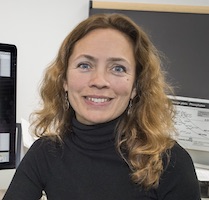
Dear Foundry Community,
As we near the end of 2022, it’s natural to reflect back on the various challenges and accomplishments that punctuated the past year.
First, I’m proud to report that in FY2022 (Oct 2021 – Sep 2022), the Foundry supported 968 users (up from 654 the previous year), a near return to our pre-pandemic numbers. Impressively, nearly 250 of those were remote users, which speaks to how user access has evolved throughout the pandemic. This is a trend we expect to accelerate as part of our Digital Infrastructure initiative discussed below. These users represent 190 institutions across 31 states and 25 countries, resulting in an estimated 400 publications where 54% were high impact (I.F. >7 as defined by DOE). You can read about the results of these collaborations on the Foundry website and review our interactive factsheet for FY2022.
Earlier this month, we celebrated two of our staff who were recipients of Berkeley Lab Director’s Awards. Sinéad Griffin was awarded in the Exceptional Early Scientific Career Achievement category for “theoretical predictions and discoveries of novel forms of quantum matter ranging from topological and complex ordered phases to new ideas for dark matter detection and quantum sensing and information, and for forging an open, inclusive and innovative research culture.” Additionally, Corie Ralston received a Director’s award for societal impact as part of the Structural Biology Team at the ALS for providing synchrotron data to guide vaccine and therapeutic development and to carry out basic virus biology science in response to SARS-CoV-2.
A discussion of the achievements of Foundry staff would not be complete without recognizing the Nobel Prize in Chemistry awarded to former Foundry Director, Carolyn Bertozzi, along with K. Barry Sharpless and Morten Meldal, for the development of click chemistry and biorthogonal chemistry. Carolyn served as the Molecular Foundry’s Director when we first opened our doors to the research community in 2006, and she founded the Foundry’s Biological Nanostructures Facility.
While we celebrate these achievements, the year has also had its challenges. As I’ve mentioned previously, we’ve had several departures this year. While this will allow us to bring new expertise and ideas to the Foundry, one of the difficulties with filling those positions is uncertainty in the federal budget process. Congress has not yet passed a new budget for FY23 (which began in October) and the current ‘Continuing Resolution’ has us operating at the lowest proposed budget, 5.6% below the previous year. Once a new budget is passed, we expect to open several searches and will also resume acting on our plan to recapitalize aging equipment.
Despite the hiring slowdown, we have a few technical staff members to welcome. In the Imaging facility, Dr. Cameron Johnson will oversee the operation of the new QSPLEEM instrument, and in the Biological Nanostructures facility, Dr. Soumi Mukherjee will be helping users with all aspects of protein-based biomaterials projects as well as helping to oversee general lab safety and operations. In addition to these new faces, I’m happy to announce that Dr. Ed Barnard, formerly a technical staff scientist in our Imaging facility, has formally transitioned to a new role as the Data and Analytics Lead Scientist for the Molecular Foundry. In this new position, Ed will lead the Foundry’s digital infrastructure vision and strategy, from enabling automated processes and feedback loops and implementing data sharing and analysis pipelines to building data support infrastructure to translate scientific and technical requirements into computing technologies in support of current and future Foundry capabilities.
I continue to be inspired by the vibrant, collaborative community that drives the Foundry’s accomplishments and if you have feedback for us, please do reach out at any time. We will continue to keep lines of communication open as we look ahead to the coming year. Additionally, elections will soon open for selecting new members for our User Executive Committee (UEC) which serves as the collective voice of the community and I encourage you to participate.
All the Best,
Kristin

